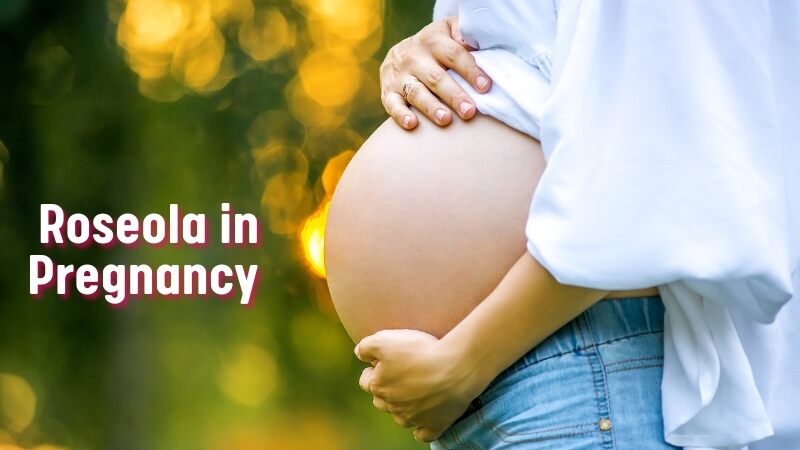
Roseola is a viral infection which generally affects neonates and children up to age 3 years. This is also known as the sixth disease, baby measles, a three-day fever. During pregnancy mother can get affected by children but it is not seen to cause any congenital anomaly of the fetus. If there is good maintenance of hygiene in the family roseola can be prevented. There are about 45% of cases are infected in USA.
In this article, we will be discussing in detail about roseola in pregnancy. About signs and symptoms, how to diagnose roseola, treatment of roseola, and how to prevent it. Once in a while, a pregnant woman gets exposed to some illness that is exceptionally common among children (childhood disease) and very rare among grown-ups. One of them is Roseola in pregnancy.
What is Roseola?
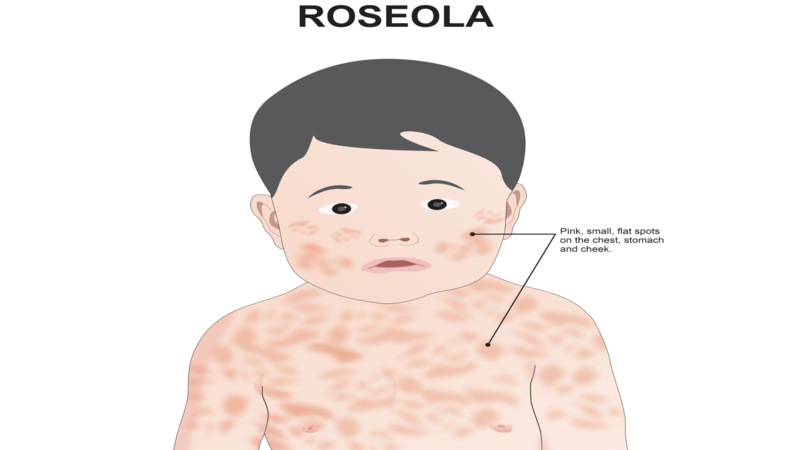
Roseola (Roseola infantum) is a mild infection that more often strikes babies by the age of two. Roseola is common to the point that most kids have been infected with Roseola when they enter kindergarten and Roseola in pregnancy also. A virus called human herpesvirus – 6 (HHV-6) is responsible for Roseola.(1)
How Does Roseola Spread?
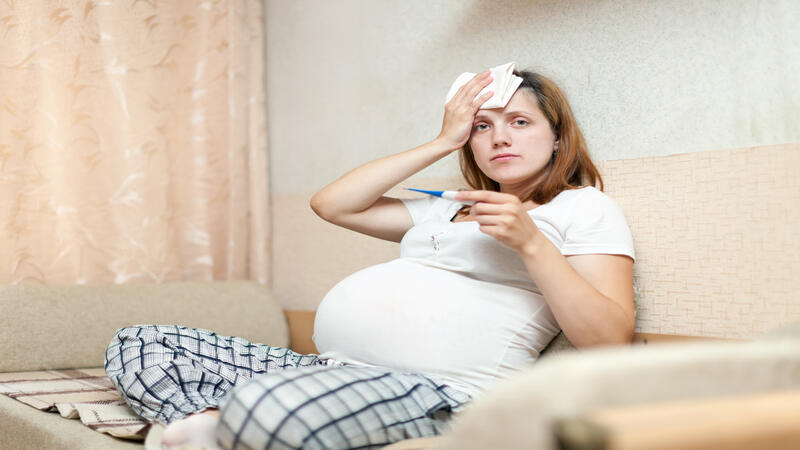
Roseola is spread through contact or even sharing the same room with the infected person as the respiratory secretion carries the virus. Through sneezing and cough, the virus becomes airborne (transported by air). (3)
Roseola usually is harmless. Once in a while, a high fever can bring about issues (like seizures or febrile convulsions in babies) caused due to a spike in the body temperature. Treatment of Roseola incorporates bed rest, liquids, and solutions to diminish fever. (4)
How Does Get Roseola in Pregnancy?
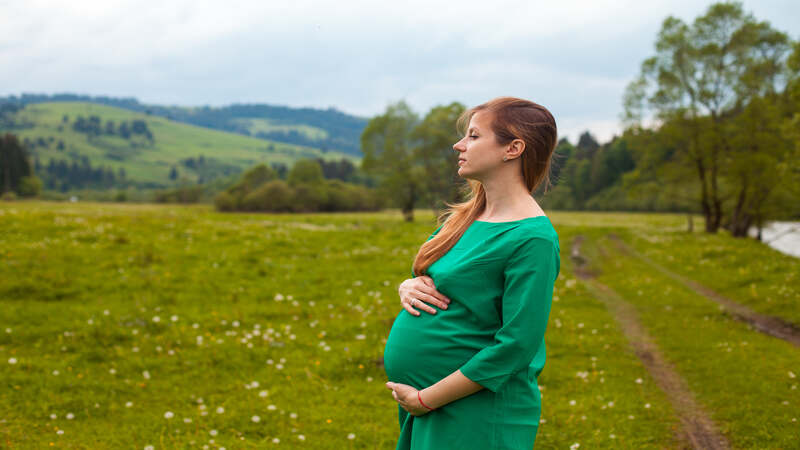
A pregnant woman is exposed to viruses all the time. Roseola in pregnancy is a period when the immune system restrains, which makes pregnant women more susceptible to infections. If she exposes to the HHV-6 virus, there are chances (which can’t overlook) that the mother gets the infection. However, if she had had Roseola in her childhood, she would be immune and not get it again. It is not common, and most medical literature does not list Roseola in pregnancy as a potential congenital pregnancy infection. In this way, the Roseola in pregnancy time.
Is it Harmful to Pregnancy Women?
Usually, Pregnant women get exposed to the virus all the time. By that time, pregnant women, mostly carry the antibody, which means they had the disease already, so they are immune and can’t get it back again.(7)
Roseola has affected the fetus during pregnancy has very few chances, so the risk to the fetus after exposure is generally very low chances, especially when the vast majority of women are immune.
How is Roseola in Pregnancy Treated?
The treatment of Roseola in pregnancy includes common measures taken to bring down a fever which provides for: (8)
- Take plenty of fluids.
- Eat warm and fresh food.
- Put the wet cloth in the forehead.
- Take plenty of rest.
- If needed, medicine to bring down the temperature can take after consulting your doctor.
Can Roseola in Pregnancy Cause Harm to The Pregnant Woman or the Baby?
Even though no proof being exposure to Roseola in pregnancy has any negative impact on the mother or child, it can still say that there is some probable risk to the developing fetus.
If the mother has been exposing to this virus during her childhood or adolescent period, then the subsequent exposure during pregnancy cannot cause any issues. A study shows that the HHV-6 virus is found in the cervix of 20% of the healthy women (during normal delivery). It indicates that the infection would not affect pregnancy adversely.(9)
Be that as it may, if a pregnant woman is exposed to the virus for the first time, she is likely to have some pregnancy issues:
- The HHV-6 virus believes in increasing the risk of miscarriage during the first trimester.
- If the attack of the virus occurs in the later stage of pregnancy, there is a remote but an inevitable chance that the baby could have some congenital disabilities.
When to Visit a Doctor or Call Your Baby’s Doctor?
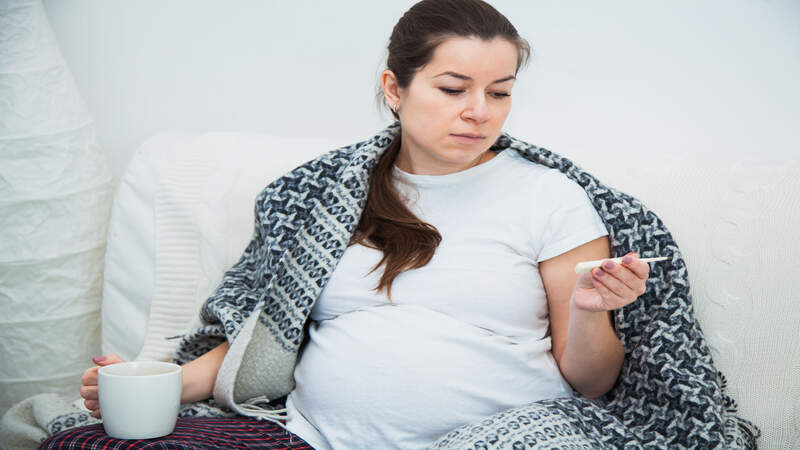
If below mention symptoms take place. Call your child’s doctor:(10)
- Your kid has a high fever of more than 103 F (39.4 C).
- The rash won’t increase after three days.
- Your kid has Roseola, and the high fever lasts more than seven days.
What Should Precautionary Measures Be Taken to Avoid Roseola During Pregnancy?
To be on the safer side, a pregnant woman should try to avoid the exposure to the virus, especially if not exposed to it in her childhood:(11)
- Must keep a distance from children and grownups who are infected with this virus.
- Seek medical attention immediately if the infection of HHV-6 is suspected.
- All members of the house (if one of the members is infected) ought to wash their hands habitually to avoid the spread of the infection to the pregnant woman.
What Are the Symptoms of Roseola in Kids?
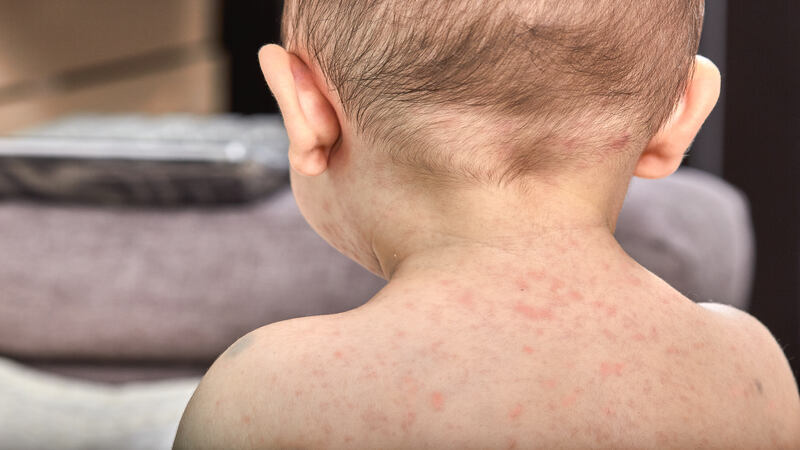
Roseola generally is a self limiting disease which wears off within a week. But the main symptoms which is high grade fever which lasts for 2 to 4 days which can make the children or the pregnant women weak. So proper symptomatic treatment to be given. The lists of symptoms which is seen in roseola are:(2)
- Fever – 103 to 105 degrees fahrenheit
- Maculopapular rashes
- Vomiting, diarrhoea
- Cough
- Loss of appetite
- Runny nose
- Pink eye
- Swelling of lymph nodes
- Sore throat
Roseola is characterized by high fever (103 to 105 degrees Fahrenheit) that generally lasts for three to five days. Fever is usually followed by rashes on the face, upper arm, and legs. The rashes are seen more in the neck and trunk. The temperature usually resolves by itself, and the rashes will disappear within a few hours to a few days after it appear. When a child gets infected by the virus, he develops antibodies against the virus that last a lifetime providing long-standing immunity against Roseola.
Nearly most of the children can get infected with Roseola. Some children get infected but do not develop the rash. In such cases, the parents can be oblivious to the fact that the child infects with HHV–-6, and the fever associated with Roseola will misinterpret as a normal fever.
How Does Roseola Affect Adults?
Different studies show that somewhere around 81% and 97% of grown-ups had developed antibodies to this infection by the time they become four years old as most of the people get this childhood infection by that age. But there are chances that an adult gets this infection when exposed to the virus, especially if the immune system is weak or if the roseola virus hasn’t infected him or her during childhood.(5)
What Symptoms Are Caused by Roseola in Adults?
The symptoms of Roseola in adults differ from that of the children. The symptoms start only after a couple of weeks. Some of the symptoms are:(6)
- High temperature
- Loss of desire to eat
- After the fever abates, rashes appear first at the torso, and scan spread to neck, face, arms, and legs
- Swollen lymph nodes
- A sore throat and runny nose
As we have already discussed in this article this disease generally effects children and pregnant women can get infected by children. If proper hand washing is done then this disease can be prevented. But if the children or even the pregnant women gets infected immediate consultation with the health care professional to be done for proper treatment for the same.
Such safety oriented measures will unquestionably bring down the risk of the impact connected with this disease.
FAQ’s
1. Am I At a Risk of Getting Roseola When Am Pregnant?
Pregnancy weakens the immunity. If you have not suffered from Roseola as a child, you can get infected. This is not very common though.
2. If I Get Roseola When Pregnant, Will My Baby Get it Too?
No, not necessarily. The mother can be infected without transferring it to the baby. Fetus getting infected is very unlikely.
3. Can I be Infected With Roseola From My Toddler?
Yes, it is possible. Your immunity is weak when pregnant. Since you will be in close contact with your infected child, you might also be infected.
4. Can I Take Medicines for Roseola During Pregnancy?
Only if your doctor prescribes. Medicines are generally avoided during pregnancy. Strong medicines can impact the baby.
5. What Can Be Mistaken For Roseola?
Roseola can be mistaken from measles and rubella rashes. Since all the three conditions have maculopaular rashes. But it is differentiated by the colour of the rashes.
6. Can Parents Get Sick From Roseola?
Parents can be infected from roseola from children and get sick. Mainly roseola infects children from age group of 6 months to 3 years.
7. How Many Days Does Roseola Last?
Roseola rash which are common in children lasts between 2 to 4 days. There can be complications like febrile seizures but its rare. The condition gets better within a week.
8. What Is The Best Treatment For Roseola?
Generally roseola is a self limiting disorder. Only symptomatic treatment to be given as at treatment. Rest, hand washing, fluid intake, fever medication to be given as a symptomatic measures.
Reference
- Irving WL, Chang J, Raymond DR, et al Roseola infantum and other syndromes associated with acute HHV6 infection.Archives of Disease in Childhood 1990;65:1297-1300 – https://adc.bmj.com/content/65/12/1297.short#
- Alfredo Rebora, Giulia Ciccarese, Astrid Herzum, Aurora Parodi, Francesco Drago, Pityriasis rosea and other infectious eruptions during pregnancy: Possible life-threatening health conditions for the fetus, Clinics in Dermatology, Volume 38, Issue 1, 2020, Pages 105-112 – https://www.sciencedirect.com/science/article/abs/pii/S0738081X19301968#
- Mark Young Stoeckle, Weil Medical College of Cornell University, New York, New York, 10021 – https://www.annualreviews.org/content/journals/10.1146/annurev.med.51.1.423#
- Yoshizo Asano; Tetsushi Yoshikawa; Sadao Suga; Ikuko Kobayashi; Toshihiko Nakashima; Takehiko Yazaki; Yuji Kajita; Takao Ozaki Pediatrics (1994) 93 (1): 104–108. – https://publications.aap.org/pediatrics/article-abstract/93/1/104/59312/Clinical-Features-of-Infants-With-Primary-Human#
- Penelope A. Bryant, Mike Sharland, Acute childhood exanthems, Medicine, Volume 37, Issue 12, 2009,
Pages 686-690 – https://www.sciencedirect.com/science/article/abs/pii/S1357303909002515# - Parker H, Auckland C. Management of common infections in pregnancy. InnovAiT. 2016;9(3):161-169 – https://journals.sagepub.com/doi/abs/10.1177/1755738015622492#
- Seilesh Kadambari, Shelley Segal, Acute viral exanthems, Medicine, Volume 45, Issue 12, 2017, Pages 788-793 – https://www.sciencedirect.com/science/article/abs/pii/S1357303917302517#
- Leach, Charles T. MD. Human herpesvirus-6 and -7 infections in children: agents of roseola and other syndromes. Current Opinion in Pediatrics 12(3):p 269-274, June 2000. – https://journals.lww.com/copediatrics/abstract/2000/06000/human_herpesvirus_6_and__7_infections_in_children_.17.aspx#
- Common communicable diseases in children: viral exanthems ; Perrier, Helene. CPJ. Canadian Pharmaceutical Journal; Ottawa Vol. 132, Iss. 8, (Oct 1999): 29-30. – https://www.proquest.com/openview/5bb1307634900489dca625b92e48030c/1?pq origsite=gscholar&cbl=28466#
- Sachdev A. Common childhood exanthemata. InnovAiT. 2021;14(6):364-370. – https://journals.sagepub.com/doi/abs/10.1177/17557380211000789#
- Potekaev N, Zatorskaya N, Porshina OP3.352 Prevention of Congenital SyphilisSexually Transmitted Infections 2013;89:A259. – https://sti.bmj.com/content/89/Suppl_1/A259.2.short#

